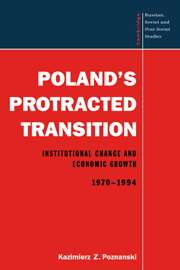Book contents
- Frontmatter
- Contents
- Preface
- Introduction: Research agenda, conceptual model and principal findings
- Part I Imperfect decentralization, broken political contracts and foreign-debt crisis
- 1 Import-led growth policy under ‘soft’ planning
- 2 Impact of technology imports on national economy
- 3 The constraining role of political factors
- Part II Economic reforms, divided society and ‘growth fatigue’
- Part III Communist legacy, ‘shock therapy’ and economic recession
- Appendix
- Notes
- References
- Index
- Titles in the series
2 - Impact of technology imports on national economy
Published online by Cambridge University Press: 29 October 2009
- Frontmatter
- Contents
- Preface
- Introduction: Research agenda, conceptual model and principal findings
- Part I Imperfect decentralization, broken political contracts and foreign-debt crisis
- 1 Import-led growth policy under ‘soft’ planning
- 2 Impact of technology imports on national economy
- 3 The constraining role of political factors
- Part II Economic reforms, divided society and ‘growth fatigue’
- Part III Communist legacy, ‘shock therapy’ and economic recession
- Appendix
- Notes
- References
- Index
- Titles in the series
Summary
Much empirical research has been devoted to the question debated here of whether the Gierek import-led strategy was helpful in building Poland's export capacities and thus avoiding an economic crisis on the scale of 1979–82. While no conclusive evidence was produced at the time of the crisis, the view that the growth strategy failed to accomplish such economic goals gained great currency. It was not the knowledge of massive misallocation of imports - and credits used to pay for them - that gave credence to this view, but rather the fact that from the very outbreak of the crisis, intra-party factions found it a potent instrument in their efforts to oust the Gierek regime. This view was also well received by the workers, generally distrustful of the party leaders' ability to run economic affairs properly. With the departure of Gierek's regime, there was virtually nobody left to challenge this opinion on ineffective import use.
What helped to solidify the negative assessment of import-led policy outside of political circles, in the academic literature, was again not so much the supporting evidence as the fact that it conformed with the general understanding that the economic system of state planning, as operated under Gierek, was extremely inefficient. Gierek's strategy was doomed to fail because such a system makes it impossible to identify the least costly - in terms of lost opportunities - options. Under such a system, political interference takes precedence over economic calculations, whether done correctly or not, so that politically over-represented, well-established producers effectively block the flow of imports to new lines of production.
- Type
- Chapter
- Information
- Poland's Protracted TransitionInstitutional Change and Economic Growth, 1970–1994, pp. 32 - 57Publisher: Cambridge University PressPrint publication year: 1997

